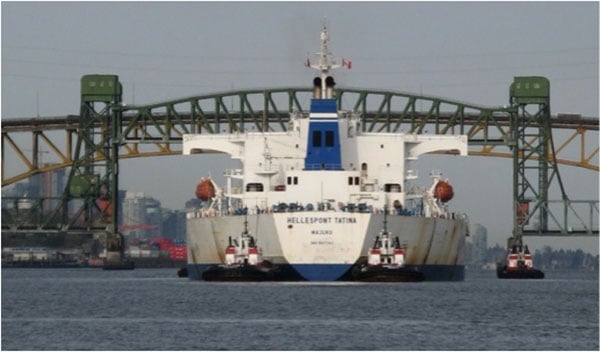Is it safe? That was the question posed last July when Mayor Gregor Robertson convened a special meeting of Vancouver city council to discuss increased oil tanker traffic through the treacherous waters of Burrard Inlet.
Vancouver has quietly become a major oil port, as the capacity of the Kinder Morgan pipeline from Alberta to Burnaby has recently been scaled up to 300,000 barrels per day. Every week several oil tankers squeeze through Second Narrows at the highest tides with less than two metres of water under the keel. These shipments have doubled over the last two years.
At the July meeting, Captain Stephen Brown of the B.C. Chamber of Shipping assured the city that these transits were happening in "total safety" and that "We have yet to have a pollution incident from a double hull tanker."
Since 1993, an international agreement requires that all new tankers have a double-hulled design. Only about 50 single-hulled tankers exist in the world and none are allowed in North American waters. But is it true that there has never been a pollution incident from a double hull tanker? Hardly.
In May of this year, the double-hulled tanker Bunga Kelana 3 spilled 2.9 million litres of crude into the waters off Singapore after being struck by a freighter.
Last January, the double-hulled tanker Eagle Otome spilled 1.7 million litres of crude oil at Port Arthur, Texas after a collision with a barge.
In 1992, the double-hulled carrier Aegean Sea broke apart after running aground and spilled 76 million litres of crude into the ocean off of northern Spain.
'Not a panacea': European study
While double-hulled tanker designs have no doubt increased the safety of marine traffic, they have by no means eliminated the risk. A 2005 report by the European Maritime Safety Agency warned: "The introduction of the double-hulled tanker would not be the panacea for prevention of future pollution from tankers at sea."
The authors conclude that in most cases double-hulled vessels are safer, however they also raised a number of concerns, including:
- 1. Accelerated structural corrosion in water ballast and in cargo tanks
- 2. The lack of mandatory provisions relating to coatings for cargo and ballast tanks
- 3. Fatigue
- 4. A demanding and difficult maintenance regime which, if not properly observed, could lead to structural deterioration
- 5. Lack of mandatory and harmonized procedures for monitoring workmanship and standards of construction during the vessel construction and repair
The panel also cautioned that many of the vessels are nearing 20 years old, and corrosion and metal fatigue between the hulls could be concealed from view unless the vessel owners invest in rigorous monitoring.
Most commercial vessels are registered with nations with comparatively lax shipping regulations, and fully 40 per cent of the world's gross shipping tonnage are conveniently flagged to just three nations: Liberia, Panama and the Marshall Islands.
Nightmare scenario in Vancouver's port
So what could happen if a double-hulled tanker went aground in Second Narrows? At 240 metres, Aframax tankers are twice as long as the Second Narrows channel is wide. A worst-case scenario might involve the bow of a tanker running aground on one side of the channel and the stern being carried by the ship's momentum to ground on the other side.
As the tide falls, the fully loaded ship is supported by only bow and stern. Not designed for such stresses, the hull ruptures, spilling crude oil on a five-knot tidal current out into English Bay and the Strait of Georgia.
Under such conditions, there would be little hope of quickly containing the oil with floating booms, or maneuvering another vessel alongside to pump out the grounded tanker.
Such a scenario is of course speculation, and the structural behavior of a specific ship is a technical question that requires the expertise of a naval architect. However, it is clear from recent shipping incidents and expert opinion that double hull designs do not guarantee that spill will not occur, nor assure "total safety." ![]()
Read more: Energy
















Tyee Commenting Guidelines
Comments that violate guidelines risk being deleted, and violations may result in a temporary or permanent user ban. Maintain the spirit of good conversation to stay in the discussion.
*Please note The Tyee is not a forum for spreading misinformation about COVID-19, denying its existence or minimizing its risk to public health.
Do:
Do not: